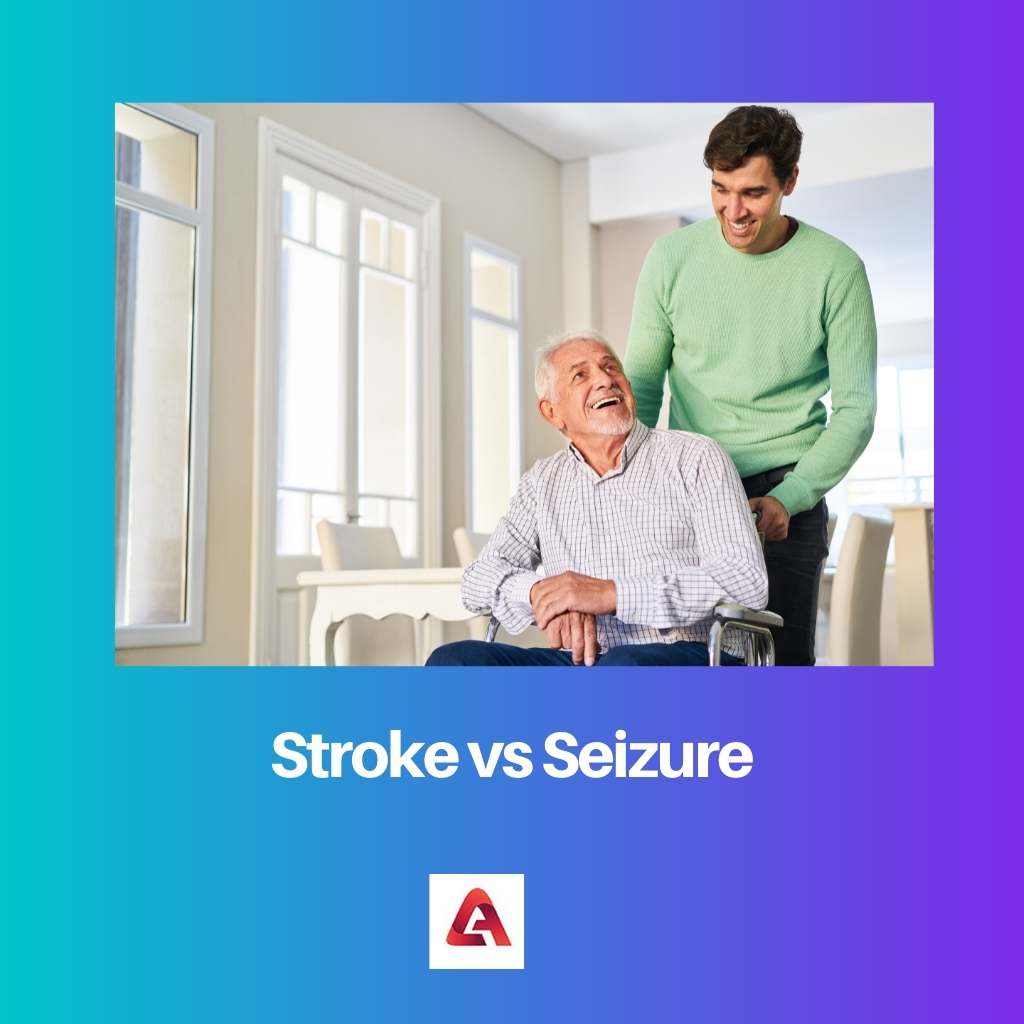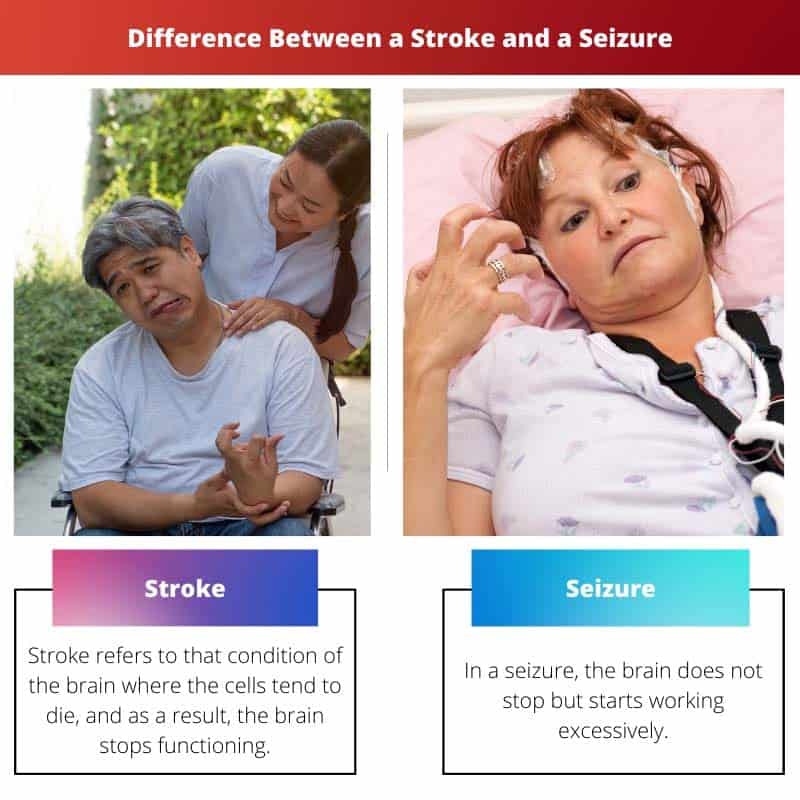In the modern medical world, inventions have been made every day to treat diseases with new methods and drugs. Stroke and seizure are two brain diseases where new methods and therapies have been applied to cure them.
But before treatment, one needs to identify whether it is a stroke or a seizure. As both of these medical conditions include the brain, their symptoms can be overlapping.
Key Takeaways
- A stroke is a medical emergency caused by an interrupted blood supply to the brain. At the same time, a seizure is a sudden, uncontrolled electrical disturbance in the brain that can cause changes in behavior, movements, or feelings.
- A stroke can cause permanent brain damage or death, while seizures are not life-threatening.
- A stroke can be prevented or treated with medication or surgery, while seizures can be managed with medication and lifestyle changes.
Stroke vs Seizure
The difference between a stroke and a seizure is that a person’s brain stops working during a stroke, whereas, in a seizure, the brain passes through an overactive phase. Though in both of these clinical conditions, the patient’s brain is a danger which may lead to that person’s death. So it is very important to differentiate a stroke from a seizure to start proper treatment.

Stroke refers to that condition of the brain where the cells tend to die, and as a result, the brain stops functioning. It happens when an artery is blocked, and the blood cannot reach the brain to provide oxygen and nutrients that are essential for a brain to function properly.
On the other hand, in a seizure, the brain does not stop but starts working excessively. The electrical system in the brain suffers from a malfunction and starts firing the brain cells rapidly.
In this condition, the patient’s whole body or a particular body part might start shaking.
Comparison Table
| Parameters of Comparison | Stroke | Seizure |
|---|---|---|
| Definition | In a stroke, the brain stops working and eventually die. | In a seizure, the brain does not stop. It overworks. |
| Types | There are two types of strokes- Ischemic and Hemorrhagic. | Seizure can be of two classes- Epileptic and Non-epileptic. |
| Causes | Hypertension, blood clot, overuse of drugs and medicines. | Low blood pressure, fever, medications. |
| Effect | The patient’s body can be paralysed. | It does not affect the body severely. |
| Treatment | One needs to uproot the causes behind a stroke such as obesity, cholesterol etc. | Anti-seizure drugs can come to the rescue. |
What is a Stroke?
A stroke can be classified as a type of brain attack where a certain part of the brain does not get the required blood supply. This interruption of blood supply can happen due to many reasons.
The brain stops working because it does not work properly without enough oxygen and nutrients from the blood.
There are two major types of stroke- Ischemic and Hemorrhagic stroke. The former happens when an artery is blocked, and the latter is caused by a ruptured artery.
Ischemic strokes happen when blood cannot pass through an artery since it is blocked. This blood clot can be formed internally inside the blood vessel. But a clot can also happen to travel to the brain and cause a stroke.
On the other hand, hemorrhagic stroke happens because of an artery’s rupture or leakage. Hypertension can be one potential reason behind this cause.
Apart from this, overuse of drugs and abnormal formation of blood vessels is also the major causes of a brain haemorrhage. In both cases, a stroke happens mainly due to an interrupted blood supply to the brain.
However, when a person is suffering from a brain stroke, the patient’s facial muscles can be paralysed. He or she may experience dizziness, the tendency to vomit or even a severe headache.
A cerebral stroke is an emergency and needs immediate medical attention. Before treating a stroke, one needs to determine whether it is Ischemic or Hemorrhagic.
What is a Seizure?
A seizure indicates a malfunction in the electrical system of the brain. It is almost like a sudden abnormal brain cell electrical activity.
This can be caused by the abnormal repetitive firing of brain cells or the over-coordination of brain cells firing together. It is assumed that it fatigues brain cells, but neurologists believe that it does not cause brain cell injury.
The postictal period explains the time after the seizure. At this time, the brain cells remain exhausted from working so hard. Now seizures can be classified into two types- epileptic and non-epileptic seizures.
Epilepsy or epileptic seizure are those seizures that occur more than once and are not triggered. But if the seizures occur only once and are triggered, they are called non-epileptic seizures.
Low blood pressure, fever, a minor head blow, drugs, and medications can cause physiological seizures. Seizures mainly happen due to an influence outside of the brain.
It can also be caused by an untriggered spontaneous electrical discharge from within the brain cells. Seizures can be avoided by simply controlling all the factors that can trigger them.
Epileptic seizures can be best treated with anti-seizure medicines. But dietary therapy has proved to be effective in reducing the causes behind the reoccurrence of seizures.
Nerve stimulation therapy can be used as another treatment to avoid seizures. However, surgery can also remove the part of the brain that causes a seizure.
Main Differences Between a Stroke and a Seizure
- Strokes occur when the blood is not supplied to a certain part of the brain due to some internal or external cause. A seizure is also a clinical situation where the brain’s electrical system suffers a sudden, abnormal malfunction, and the human body starts shaking.
- There are two types of stroke- Ischemic and Hemorrhagic. A seizure can be of two types- Epileptic and Non-epileptic.
- When in stroke, the brain is claimed to be stopped working. In seizures, the brain works excessively and abnormally.
- Stroke is much more serious as brain cells die in this medical condition. A seizure may appear more dramatically, but a patient can surely recover from it.
- Strokes can happen due to many reasons, such as high blood pressure, blood clot, medications etc. Seizures happen when the patient has low blood pressure, fever or takes medications frequently.





